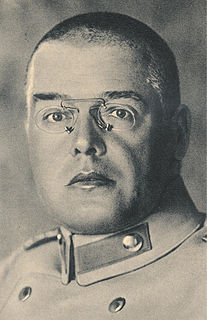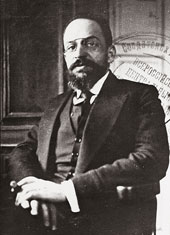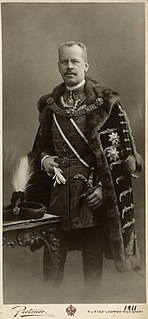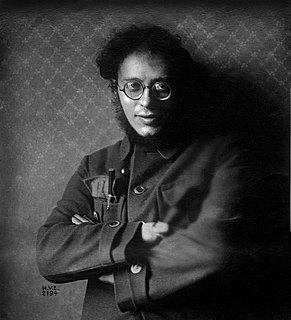 W
WVasili Mikhailovich Altfater was a Russian-Soviet naval officer, the first Commander-in-chief of the Soviet Navy.
 W
WAnastasia Alekseevna Bitsenko, née Kameristaya was a Narodnik-inspired, later Communist, Russian revolutionary. As a member of a socialist revolutionary (SR) flying combat detachment, she came to fame for assassinating the former Russian Minister of War Viktor Sakharov in 1905. After being held in detention for over 11 years, she was freed during the February Revolution and joined the Left Socialist-Revolutionaries. For her achievements, the party designated her as their representative within the Soviet delegation for the German-Russian peace negotiations in World War I, which resulted in the Treaty of Brest-Litovsk. She eventually sided with the Soviet regime for good, adhering to the Communist ideology.
 W
WGeorgy Vasilyevich Chicherin, also spelled Tchitcherin, was a Russian Marxist revolutionary and a Soviet politician who served as the first People's Commissar for Foreign Affairs in the Soviet government from March 1918 to July 1930.
 W
WOttokar Theobald Otto Maria Graf Czernin von und zu Chudenitz was an Austro-Hungarian diplomat and politician during the time of World War I, notably serving as Foreign Minister from 1916 to 1918.
 W
WCarl Adolf Maximilian Hoffmann was a German military strategist. As a staff officer at the beginning of World War I, he was Deputy Chief of Staff of the 8th Army, soon promoted Chief of Staff. Hoffmann, along with Hindenburg and Ludendorff, masterminded the devastating defeat of the Russian armies at Tannenberg and the Masurian Lakes. He then held the position of Chief of Staff of the Eastern Front. At the end of 1917, he negotiated with Russia to sign the Treaty of Brest-Litovsk.
 W
WAdolph Abramovich Joffe was a Russian revolutionary, a Bolshevik politician and a Soviet diplomat of Karaite descent.
 W
WLev Borisovich Kamenev was a Bolshevik revolutionary and a prominent Soviet politician.
 W
WLev Mikhailovich Karakhan (Karakhanian) Armenian Լևոն Միքայելի Կարախանյան, Russian Лев Михайлович Карахан was a Russian revolutionary and a Soviet diplomat. A member of the RSDLP from 1904. At first a Menshevik, he joined the Bolsheviks in May 1917.
 W
WRichard von Kühlmann was a German diplomat and industrialist. From 6 August 1917 to 9 July 1918, he served as Germany's Secretary of State for Foreign Affairs. In December 1917 von Kühlmann explained the main goals of his diplomacy was to subvert and undermine the political unity of the enemy states:The disruption of the Entente and the subsequent creation of political combinations agreeable to us constitute the most important war aim of our diplomacy. Russia appeared to be the weakest link in the enemy chain. The task therefore was gradually to loosen it, and, when possible, to remove it. This was the purpose of the subversive activity we caused to be carried out in Russia behind the front--in the first place promotion of separatist tendencies and support of the Bolsheviks. It was not until the Bolsheviks had received from us a steady flow of funds through various channels and under different labels that they were in a position to be able to build up their main organ, Pravda, to conduct energetic propaganda and appreciably to extend the originally narrow basis of their party. The Bolsheviks have now come to power; how long they will retain power cannot be yet foreseen. They need peace in order to strengthen their own position; on the other hand it is entirely in our interest that we should exploit the period while they are in power, which may be a short one, in order to attain firstly an armistice and then, if possible, peace.
 W
WLeopold Maximilian Joseph Maria Arnulf, Prinz von Bayern was born in Munich, the son of Prince Regent Luitpold of Bavaria (1821–1912) and his wife Archduchess Augusta of Austria (1825–1864). He was a Field Marshal (Generalfeldmarschall) who commanded German and Austro-Hungarian forces on the Eastern Front in World War I.
 W
WKajetan Mérey von Kapos-Mére, was an Austro-Hungarian diplomat of Hungarian origin serving as ambassador at Rome at the outbreak of World War I.
 W
WWilhelm Maria Theodor Ernst Richard Graf von Mirbach-Harff was a German diplomat.
 W
WGrigory Ivanovich Petrovsky was a Ukrainian Soviet politician and Old Bolshevik. He participated in signing the Treaty on the Creation of the USSR and the Treaty of Brest-Litovsk. Petrovsky was one of the officials responsible for implementing Stalin's policies such as collectivization.
 W
WKarl Berngardovich Radek was a Marxist active in the Polish and German social democratic movements before World War I and an international Communist leader in the Soviet Union after the Russian Revolution.
 W
WVasil Hristov Radoslavov was a leading Bulgarian liberal politician who twice served as Prime Minister. He was Premier of the country throughout most of World War I.
 W
WGrigori Yakovlevich Sokolnikov was a Russian Old Bolshevik revolutionary, economist, and Soviet politician.
 W
WPēteris Stučka, sometimes spelt Pyotr Ivanovich Stuchka, was a Latvian jurist and communist politician who served as the leader of Bolshevik government in Latvian SSR during the Latvian War of Independence and later a statesman in the Soviet Union.
 W
WMehmed Talaat, commonly known as Talaat Pasha or Talat Pasha, was an Ottoman Turkish revolutionary and politician of the late Ottoman Empire who served as its de facto leader from 1913 to 1918. Operating the worlds first one party dictatorship, Talaat Pasha was the leader of the Committee of Union and Progress (CUP), which followed an ideology known as İttihadism. The Armenian genocide and other ethnic cleansing operations were undertaken during his time as Minister of Interior Affairs during World War I. Following the Mudros Armistice, Talaat fled to Germany in exile, where he was assassinated.
 W
WLev Davidovich Bronstein, better known as Leon Trotsky, was a Ukrainian-Russian Marxist revolutionary, political theorist and politician. Ideologically a communist, he developed a variant of Marxism which has become known as Trotskyism.